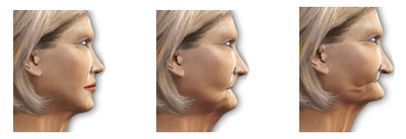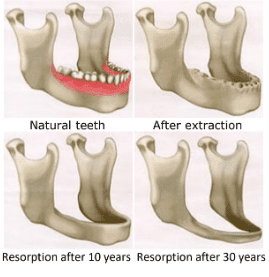Information
Patient
Education Information and Videos
Annual Denture Check
What to Expect
If you have dentures, ensuring that they fit and function properly is essential for your well-being. It provides maximum comfort, allows you to chew efficiently and maintains your appearance. You can receive the care and attention at Hosack Denture Clinic for you and your denture with our annual denture check-up services. It offers you an opportunity to identify problems early, give you peace of mind, and save on expensive treatments in the long run. During this annual re-care appointment, we will carefully examine both your mouth and your dentures for any signs of possible concern.
Oral Tissue and Jaw Bone
Over time, your mouth undergoes inevitable changes after tooth loss or tooth removal, including shrinking jaw bone on which your dentures rest. The soft gum tissue covering the jaw bone also changes over time. However, your denture’s fitting surfaces do not change, and as a result, dentures may no longer fit as they did initially. This is why it is vital to receive regular check-ups to determine if your dentures require adjustments or reline to fit your mouth correctly.
What We Check For:
What to Expect During Your Annual Visit
To achieve and maintain optimum oral health, call us to book your annual denture check-up and oral exam today.
Bone
Resorption
Dental implants are replacement, or substitute tooth roots, used to replace natural tooth roots in areas where teeth are missing. Dental implants are fabricated of titanium and are placed into the jaw where they bond with the jawbone to form virtually permanent supports for replacement teeth. This bonding process is known as “osseo integration”.
Natural tooth roots are embedded in the bone. Their job is to stimulate bone growth and provide a stable foundation necessary to bite and chew.
Facial
Structure Collapse

When all or some of your teeth are missing, the jawbone is not being stimulated and as a result the area of bone in which teeth are missing deteriorates rapidly. In addition, as the bone shrinks away your muscles migrate, or pull back from their natural position. Complete tooth loss and the deterioration of the jawbone can also result in significant overall health problems related to improper digestion, from not being able to chew your food properly. Over time, as the bone resorbs (shrinks) facial structures continue to collapse, and the dentures must be relined (made thicker) to compensate for additional bone loss.
Your lips cave in as they lose support, and wrinkles increase dramatically as your facial structures collapse. This leads to the appearance of jowls and witch’s chin. Dental implants act as artificial tooth roots and since the bone actually bonds to the titanium in the dental implant, they serve the same function as the natural tooth roots, providing continued bone stimulation and stable foundation, as well as helping to prevent the related health problems that would normally occur with complete tooth loss. Replacing your teeth with implant-supported overdentures will preserve the bone and prevent the further deterioration of facial structures.
Many people enjoying the benefits of implant-supported dentures say that they have been able to restore their self-esteem and self-confidence as a result of improved appearance, function, comfort and health.

Denture
Care
Brush and rinse your dentures daily. Like natural teeth, dentures must be brushed daily to remove food and plaque. Brushing also helps prevent the development of permanent stains on the dentures. Use a brush with soft bristles that is specifically designed for cleaning dentures. Avoid using a hard-bristled brush as it can damage or wear down dentures. Gently brush all surfaces of the denture and be careful not to damage the plastic or bend attachments. In between brushings, rinse your dentures after every meal.
Clean with a denture cleaner. Hand soap or mild dishwashing liquid can be used for cleaning dentures. Household cleansers and many toothpastes may be too abrasive for your dentures and should not be used. Also, avoid using bleach, as this may whiten the pink portion of the denture. Ultrasonic cleaners can be used to care for dentures. These cleaners are small bathtub-like devices that contain a cleaning solution. The denture is immersed in the tub and then sound waves create a wave motion that dislodges the undesirable deposits. Use of an ultrasonic cleaner, however, does not replace a thorough daily brushing.
Consequences of
Tooth Loss
The most significant consequence of tooth loss is the shrinkage of bone or resorption. Resorption takes place because the bone that the teeth are rooted within, the alveolar bone, exists only for the sake of the teeth. Like other cellular structures, bone tissues require stimulation to maintain their shape and overall health. Tooth roots provide this necessary stimulation to the jawbone. When this bone no longer holds teeth, it is not being stimulated, and it will start to shrink wherever teeth are missing. The more missing teeth, the greater the shrinkage, and the faster it occurs. This bone loss can affect nearby healthy teeth and increase the difficulty of fitting dentures. Although the rate of bone loss is most rapid shortly following extractions, it continues long after the teeth are extracted.
Studies show that an average of 4 mm of bone resorption (shrinkage) can occur in the first year after tooth loss, and 0.5 mm per year thereafter can be experienced by conventional denture wearers. Over a five-year period, approximately 5.2 mm of vertical bone height can be lost and will continue indefinitely.
This is significant as bone loss also causes changes in the shape of the facial structure, and support of the soft tissues, resulting in the supporting muscles of the face withdrawing inward. Also, the lips lose the support of the front teeth, and the jaws pull together, making it appear that the nose and chin are too close together, giving a beaklike appearance. The loss of support for the face results in an increased formation of age and wrinkles, particularly around the mouth, as the skin bunches together where it once had support.
Implant-supported dentures can help preserve bone and prevent bone loss! Dental implants are like artificial tooth roots and stimulate the bone in the same way natural teeth do. They bond or integrate with the jawbone and dramatically reduce the rate of bone loss. Studies show that, on average, people who have implant-supported dentures lost less than 0.2 mm bone after tooth loss and an average total loss over a five-year period of only 0.6 mm. Even those wearing dentures for years show a marked decrease in bone loss after having implant-supported dentures placed.
Bone preservation is just one of many health benefits of implant-supported dentures. Implant-supported dentures can dramatically improve the quality of your life. Call and ask us how!
If you would like to learn more about how implant-supported dentures can improve the quality of your life or have any questions about conventional dentures or denture care, please call our office for a complimentary consultation.
Dental Concerns for
Older Denture Wearers
Medications and Oral
Side Effects
Older adults are likely to take more medications that affect oral health and dental treatment. Hundreds of common medications, including antihistamines, diuretics, painkillers, high blood pressure medications, and antidepressants, can cause side effects on your oral health, such as dry mouth (xerostomia) and soft tissue changes, and gingival overgrowth. A dry mouth can leave your mouth without enough saliva to wash away food and neutralize plaque, making you vulnerable to tooth decay and gum disease. We can recommend various methods to restore moisture, including sugarless gum, oral rinses, and artificial saliva products. It is essential to tell us any medications you are taking, including herbal remedies and over-the-counter medicines, developing a treatment plan best suited to your situation.
Concerns for
Older Women
Women who are menopausal or postmenopausal often experience changes in their mouths and oral tissues. Studies have suggested that estrogen deficiency in postmenopausal women may result in a higher risk of severe gum disease or tooth loss. Hormonal changes in older women can result in discomfort in the mouth, including dry mouth, pain and burning sensations in gums, changes in taste, particularly salty, peppery, or sour. Most women find estrogen supplements help relieve these symptoms.
It is important to have regular denture check-ups at least once a year so that we can identify any changes to your mouth and oral tissues and advise you on appropriate steps to take to maintain optimal oral health.
Denture
Odour
One topic denture wearers don’t like to talk about, but is a reality, is denture odour.
Denture Cleaners
Dentures often develop a smell over time, since they are mere pieces of plastic left in your mouth for extended periods of time. They are constantly in contact with saliva, food, drink, and millions of bacteria. Brushing your denture and sticking it back in the mouth is generally not enough (although brushing is important). Unless advised otherwise, we suggest taking your dentures out at night and soaking them in a denture cleaning solution regularly.
Based on our and our patients’ experiences, we recommend Renew Denture Cleaner. It is a concentrated professional strength cleaner that not only disinfects and deodorizes your denture but also removes tobacco, coffee, tea, plaque, and calcium. Renew is not sold in stores but is available at Hosack Denture Clinic, 604 6 St S,
403-327-7244.
Ultrasonic Cleaning
When dentures dry out in your mouth during the night, they develop a film of dried saliva, debris and bacteria, which causes odour. So, it is important to disinfect and deodorize your dentures rather than have them. If your dentures already have an odour, another solution is ultrasonic cleaning. Our office can clean your denture ultrasonically to remove heavy staining and tartar. After dentures have been cleaned ultrasonically, the odour is dramatically improved.
For more information on denture cleaning or odour control, or for a complimentary consultation, contact our office at
403-327-7244.
Dentures and Plaque
Just like our natural teeth, plaque and tartar form on dentures too. The plaque hardens into tartar and invites bacterial accumulation, which causes tissue problems. People are often unaware that dentures require professional cleaning and daily care.
The Effects of Implant-supported Dentures on Nutrition
Studies show that individuals who lose their lower teeth and wear a conventional denture inevitably modify their diets. The lower conventional denture merely “floats” on the ridge, which means it is mobile and moves, making eating certain types of food exceedingly tricky. Unfortunately, the denture wearer eventually stops eating these foods, particularly raw vegetables, apples, steaks and other hard or tough foods, fearing their lower denture may become dislodged or fall out. They simply cannot chew these foods with conventional dentures. As a result, they consume significantly less protein and other key ingredients, including fibre, calcium, iron and some vitamins, than people who still have their natural teeth.
Implant-supported dentures remain stable because they are attached to the jawbone via dental implants and do not move around in your mouth as conventional dentures do. Depending on the type of implant-supported denture, 80 to 95% of the chewing efficiency of natural teeth can be achieved, whereas the chewing efficiency of conventional dentures is a mere 20%. You can see how this allows you to chew a much wider variety of foods. One common ailment of conventional dentures is stomach and digestive problems. The increased chewing efficiency of implant-supported dentures allows you to grind your food up into much smaller pieces (masticate), making it much easier for your stomach to digest, resulting in fewer gastrointestinal disorders.
Studies indicate that following implant-supported denture treatment, patients’ overall nutritional state improves dramatically (as much as 33%). Implant-supported dentures function like natural teeth making eating an easy and enjoyable experience once again,
Many of our patients now enjoy the benefits of implant-supported dentures and tell us they love that they can eat whatever they want.


